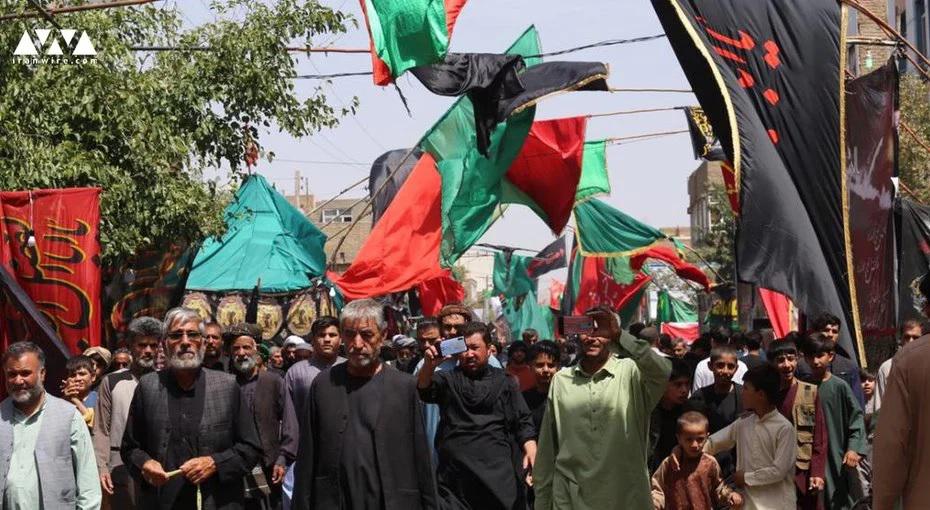Afghanistan has been grappling with escalating violence and religious persecution, particularly against the Shia Muslim community. Ashura is a solemn day of mourning observed by Shia Muslims worldwide. It falls on the 10th day of Muharram, the first month of the Islamic calendar. The day commemorates the martyrdom of Imam Hussain, the grandson of Prophet Muhammad, who was killed in the Battle of Karbala in 680 CE. The event holds immense religious and cultural significance for Shias, representing the struggle for justice, truth, and resistance against oppression.
the Taliban’s rise to power has been marked by a surge in violence against minority groups, particularly the Shia community. The Ashura processions, which attract large numbers of Shia Muslims every year to mourn and pay respects to Imam Hussain’s sacrifice, have become prime targets for the Taliban’s violent agenda. These processions, which are supposed to be peaceful expressions of faith, have been marred by deadly attacks and bombings orchestrated in the last two decades.
The systematic attacks on the Shi’ite community have eroded the faith of the minorities not only regarding the Taliban but also their very existence and survival in Afghanistan.
Exactly a year ago, a blast on 5th August 2022 (around the same time as people prepared for the mourning) in a Shi’ite neighborhood took the lives of eight innocent people. a Foreign Policy report last year highlighted the Taliban’s involvement in replacing the Shi’ite flags and attacking kiosks related to the Ashura processions. Last year as well, the Internet was shut on the occasion.
The Taliban, in blaming the IS for creating sectarian divides, continued to deny its own partisan approach but facts in the ground tell otherwise. Earlier in April, the Taliban banned the Jaafari jurisprudence from the educational curriculum, which was a big setback to the students from the community.
Once again, the holy occasion of Ashura, a significant day for Shia Muslims, became a target for the Taliban’s aggression. It was reported that in various places, mourners were not allowed to raise flags or carry out processions. There were visible restrictions on women to take part in these ceremonies even as distant viewers. The Tolo News reported that the mourners were told by the Taliban to refrain from “raising flags, placing refreshment stands by the side of the road, and touring the city in convoys”.
Even the number of congregation sites for the mourners were substantially reduced.
In conjunction with this, the Taliban’s controversial decision to ban telecommunications services in certain regions exacerbated the already precarious situation.
In recent years, the Taliban has carried out bombings and targeted shootings during Ashura processions, resulting in significant loss of life and devastating communities. Such heinous acts not only violate basic human rights and religious freedoms but also sow fear and division among different sects within the country.
Shias Under Attack in Afghanistan
The Shia minority in Afghanistan has faced relentless persecution for decades. Even before the Taliban’s return to power, extremist factions have targeted Shias, branding them as heretics and infidels. The Taliban’s extremist ideology, rooted in an ultra-conservative interpretation of Sunni Islam, sees the Shia community as a threat to their vision of an Islamic state.
The violence against Shias has manifested in brutal attacks on religious gatherings, educational institutions, and even businesses run by members of the Shia community. These attacks not only claim innocent lives but also traumatize an entire population, pushing them into a state of constant fear and insecurity.
As if the violence against minorities wasn’t enough, the Taliban’s decision to ban telecommunications services in certain regions further darkened the prospects for human rights and freedom of expression in Afghanistan. The communications ban came into effect under the pretext of controlling the flow of information and preventing dissent against the Taliban’s rule.
By restricting internet access and telecommunications, the Taliban effectively severed Afghan citizens’ connections with the outside world, cutting them off from vital information, communication with loved ones, and global support networks. This ban has led to an outrage, both within Afghanistan and across the international community, as it violates fundamental human rights and restricts access to vital services like healthcare, education, and emergency assistance.
The telecommunications ban also hampers the ability of journalists, human rights activists, and aid organizations to document and respond to the dire human rights situation in the country. This move has raised serious concerns about the Taliban’s intention to suppress freedom of expression and maintain tight control over the narrative of events in Afghanistan.
The Taliban’s brutal attacks on Ashura processions and the ongoing persecution of the Shia Muslim community underscore the urgent need for global attention and support. The violence and repression have led to widespread suffering, loss, and fear among the Afghan population, particularly minorities. Moreover, the telecommunications ban has further isolated the nation and silenced those who dare to speak against injustice.
The international community must not turn a blind eye to the plight of Afghanistan’s minorities and should exert diplomatic and humanitarian pressure on the Taliban to respect human rights and religious freedoms. Supporting organizations that provide aid and assistance to affected communities can also make a difference in alleviating the suffering of those oppressed by the Taliban’s oppressive rule. Only through concerted efforts and a united stance against violence and persecution can we hope for a more peaceful and inclusive Afghanistan.
Image – Iranwire

